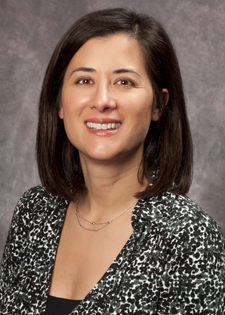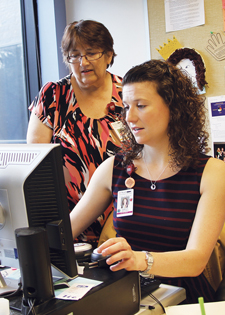Rehabilitation and Participation Science
Program in Occupational Therapy
 A mathematical model developed by faculty in the Program in Occupational Therapy confirms that factors beyond physical or medical concerns can impact a chronically ill child’s ability to learn. The model, created in the Program’s Child Health and Education Laboratory, showed that significant environmental factors, such as a child’s IQ, family income or poverty level, and the level of education of the head of the household all have a huge impact.
A mathematical model developed by faculty in the Program in Occupational Therapy confirms that factors beyond physical or medical concerns can impact a chronically ill child’s ability to learn. The model, created in the Program’s Child Health and Education Laboratory, showed that significant environmental factors, such as a child’s IQ, family income or poverty level, and the level of education of the head of the household all have a huge impact.
“We found that these risk factors had an equal if not greater impact than the physical or medical concerns,” says pediatric hematologist/oncologist Allison King, MD, MPH, who heads the laboratory. “It’s not a common belief, but more and more people are beginning to think this way.” King has thought this way for more than a decade, researching how social factors or a home environment can contribute to an ability to learn. She and her team focus on children with chronic illness, specifically those diagnosed with sickle cell anemia or children with brain tumors and some cancers. The umbrella that links these children, she says, is that they all have challenges of thinking and learning as a result of their disease.
Children with sickle cell disease (SCD), in particular, have multiple challenges. Studies indicate that up to 40 percent of high school-aged students with SCD don’t complete high school within four years. They often live at or near poverty levels. “We want to know what happens with the disease that impacts the classroom,” King says. “We then want to bridge the gap between the hospital and the school to improve children’s opportunities to learn.”
King and her colleagues in occupational therapy and pediatrics conduct research, work with children and family in clinical practices, and reach out to families directly in their own homes. The research projects include developing and evaluating an early intervention program for newborns with SCD and studying the relationship between maternal health and child development in families with SCD.
On the advocacy front, the team organizes a multitude of public health activities to increase community awareness of SCD, which is vital as children age. One in 500 African Americans are born with sickle cell disease. Up to one in 12 have sickle cell trait. “The problem is that if you have sickle cell trait and not the actual disease, it falls to the back of the mind and then that knowledge falls through the cracks when they get older and can have kids themselves,” Dr. King says. “We want to increase trait testing in teens and adults for that reason.”
 Ashley Housten, OTD/S ’14, a student in the laboratory, is focused on teaching healthy sexual behaviors and including educational information about the genetic traits of sickle cell disease to both high school nurses and students. King also is working with Washington University education specialists to partner with St. Louis area schools and public housing authorities to enhance the educational infrastructure for SCD families.
Ashley Housten, OTD/S ’14, a student in the laboratory, is focused on teaching healthy sexual behaviors and including educational information about the genetic traits of sickle cell disease to both high school nurses and students. King also is working with Washington University education specialists to partner with St. Louis area schools and public housing authorities to enhance the educational infrastructure for SCD families.
The laboratory also contributes occupational therapy for young adults with sickle cell disease. SCD patients need to be on daily medications, and King says there is a critical need to identify ways to ensure compliance with medications. Her team is funded to pilot two phone applications that either send medication reminders or collect data on patient outcomes. In another groundbreaking project, occupational therapists also have created their own parenting and developmental support program, modeled after Parents as Teachers.
“This is a disease in which we can partner science with policy and advocacy and shift people’s mindsets,” says King. “My hope is that if we continue to show proof of principle and illustrate that these interventions work, we can change policy and standard practice.”
We welcome inquiries from prospective students, potential collaborators, community partners, alumni and others who want to connect with us. Please complete the form below to begin the conversation.
Schedule an Info Session
We are excited that you are considering applying to the Program in Occupational Therapy at Washington University. Please join us for a Zoom Information Session for either our entry-level MSOT or OTD degrees or our online Post-Professional OTD. Current faculty members will discuss the degree program and answer any question you may have. We are offering these sessions on the following days and times. The content is the same for each one, so you only need to sign up for one.
Upcoming ENTRY-LEVEL Degree ZOOM Info sessions:
Schedule an Entry-Level Info Session
Upcoming PP-OTD Degree ZOOM Info session: